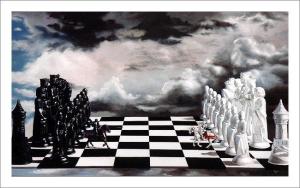Ever since reading ‘The Grand Chessboard” by Brzezinski, my entire understanding of geopolitics has been substantively changed. When placed in the analogy of a chessboard, with the key players being the United States, Russia, China, England, Germany and France, one gains a richer understanding of the global interest beginning from at least early 20th century and covering a piece of land that expands from north-east Africa through the Middle East, the Gulf States, all the way out to Japan. Brzezinski powerfully articulates the United States (and other world-powers) interest in securing that particular geographical location of the world. It serves as an important import/export route, has mass oil wells, potential capitalist market (e.g. India) and, finally, offers an important strategic position in terms of warfare and expansion of military might (as well the spreading of state-endorsed hegemonic ideals). In essence, Brzezinski highlights the rationale that various states have for wishing to exert control, influence (if not outright domination) of this highly contested part of the world.
When geopolitical relations are viewed from such a lens, one begins to understand the ongoing tension between various states, especially the United States and Russia. Both states have an interest in the region. The United States has found means by which to exert some direct influence on Afghanistan and Iraq (though many would argue that they are not doing all that good of a job). Pakistan is a complicated case, with much of the violence in Afghanistan and Iraq further spilling into that region. And with the terrorism rhetoric of today, non-state actors have become a larger part of the story. India’s prospects look better, though in such a hotly contested area, there is no predicting the impact regional changes will have on India. Meanwhile, Russia has important economic ties with Syria. Syria has had many trade embargoes and sanctions placed on it for several decades now and have routinely turned to the East for its economic affairs. This is one market, trade route, and region the Russians (and Chinese to some extent) cannot afford to lose. And certainly, they have been key players in keeping the powers that be in place for the time being. This does not mean they are committed to the parties currently in power, such as the Assad family in Syria. But most likely will not turn on him until such a time comes that they can be assured, to some degree of confidence, that the new power will maintain the economic and military ties between the two states.
But while Syria burns in the background in the interest of the global giants, the Ukraine has now become the new focus of attention (not to mention a new source of tension between the United States and Russia). With the recent fall of the Kiev and the removal of the Russian-backed leaders, there will be a small window of opportunity for the United States to attempt to exert some influence on the newly formed leadership. This would bode well for the US as well as the European Union, not to mention the people of Ukraine who wish to see their state edge closer to the European Union than a Russian confederation. Of course, there is always the worry that the Ukraine will split into two very opposing views, which may lead to the type of friction that has often resulted in countless death in Europe (and other areas).
None of this is particularly new. The names may have changed, the pons may look different, and the bishops and knights might be dressed in different garb. But the game of chess remains the same. The goal is to win. The goal is to defeat the king of your opponent. Geopolitics hasn’t changed. Our understanding of it has though. Perhaps the only difference is that while chess eventually produces a winner and loser, it is not clear who the winners are in the geopolitical game of chess. The people, however, are sadly the clear losers in this bout. Caught between competing ideologies and hoping someone on their side will yell ‘checkmate’ sooner rather than later.

